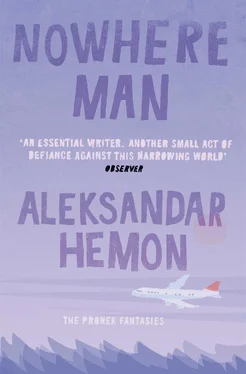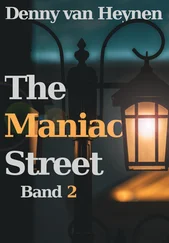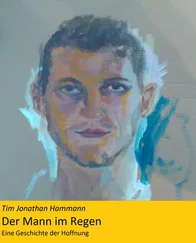“Killed?” Brdjanin cried. “No killed. Is war. They kill, they killed.”
He threw the paper across the table and it landed right in front of Pronek, so he had to look at it: a woman clutching her teary face wrapped in a colorless scarf, as if trying to unscrew her head.
“Hmm,” Pronek said, only because he thought silence might be conspicuous.
“You know what is this?” Brdjanin asked, and spurted out an excited flock of spit drops. “You know?”
“Nothing,” Pronek mumbled.
“No, is not nothing. Is Muslim propaganda.”
“Oh,” Pronek said. Where was Owen? If Owen broke in now taking out Brdjanin as he was trying to reach his gun, Pronek would run to the kitchen, grab the woman’s hand, and escape with her. “Come with me,” he would say. “ Podji sa mnom.”
“You know when bomb fall on market in Sarajevo?” Brdjanin asked, frowning and refrowning, sweat collecting in the furrows. “They say hundred people die. They all dolls, lutke. Muslims throw bomb on market. Propaganda! Then they put dolls for television, it look bad, like many people killed.”
Pronek’s mother had barely missed the shell. She had just crossed the street when it landed. She wandered back, dazed, and trudged through bloody pulp, torn limbs hanging off the still-standing counters, shell-shocked people slipping on brains. She almost stepped on someone’s heart, she said, but it was a tomato — what a strange thing, she thought, a tomato. She hadn’t seen a tomato for a couple of years.
“I have the friend,” Pronek said, trying to appear disinterested, his heart throttling in his chest, “from Sarajevo. He says the people really died. His parents are in Sarajevo. They saw it.”
“What is he?”
“He is the Bosnian.”
“No, what is he? He is Muslim? He is Muslim. He lie.”
“No, he’s not Muslim. He is from Sarajevo.”
“He is from Sarajevo, he is Muslim. They want Islamic Republic, many mudjahedini.”
Pronek slurped his coffee. The gun lay on the left-hand side, comfortably stretched like a sleeping dog — he wouldn’t have been surprised if the gun scratched its snout with its trigger. Pronek could see the woman’s shadow moving around the kitchen. Brdjanin sighed, and put both of his hands on the table, pounding it slowly as he spoke:
“How long you been here? I been here twenty years. I don’t come from nowhere. I leave my parents, my sister. I come here. Good country, good people. I work in factory, twenty years. But not my country. I die for my country. American die for his country. You die for Ukraine. We all die. Is war.”
Pronek looked out and saw Owen getting around the shovel, the paper and pen still in his hands, almost falling into the hole. Owen looked up at the window, saw Pronek and nodded upward, asking if everything was all right. Pronek quickly looked at Brdjanin, who was looking at his hand, gently hacking the table surface, muttering: “I Serb, no nothing.”
“I must go,” Pronek said. “I must go to work.”
“You go.” Brdjanin shrugged and stroked his beard. “No problem.”
Pronek stood up. Brdjanin put his hand on the gun. Pronek walked toward the door. Brdjanin held the gun casually, no finger near the trigger. Pronek opened the door, Brdjanin behind him. It was the bathroom: a radiator was wheezing, a cat-litter box underneath was full of sandy lumps. As Pronek was turning around, slowly, Brdjanin grasped Pronek’s jacket, his left hand still holding the gun, and looked at him: he was shorter than Pronek, with an exhausted yeasty smell, his eyes were moist green. He had a coffee shadow on the beard around his mouth. Pronek nodded meaninglessly, paralyzed with fear. Brdjanin bowed his head, saying nothing. Pronek could see the woman framed by the kitchen door, watching them. He looked at her, hoping she would come and save him from Brdjanin’s grasp. She would come and embrace him and say it was all okay. But she was not moving, as if she were used to seeing men in a clinch. She had her hands in her robe pockets, but then took out a cigarette and a lighter. She lit the cigarette and Pronek saw the lighter flame flickering with uncanny clarity. She inhaled with a deep sough and tilted her head slightly backward, keeping the smoke in for the longest time, as if she had died an instant before exhaling. Brdjanin was sobbing: squeally gasps ending with stertorous, shy snorts, his shoulders heaving in short leaps, his hand tightening its grip on Pronek’s jacket. Pronek imagined Brdjanin’s gun rising to his temple, the index finger pulling the trigger in slow motion — a loud pop and brains all over Pronek, blood and slime, dripping down. The woman looked down, drained, her bosom rising, patiently not looking up, as if waiting for the two men to disappear.
“It is okay,” Pronek said, and put his hand on Brdjanin’s shoulder. It was sticky and soft, with a few solitary hairs curling randomly. “It will be okay.”
“What the hell were you doing in there?” Owen asked curtly standing at the bottom of the stairs with his hands on his hips. “I almost went in there shooting to save your ass.”
Pronek descended the stairs. The sun was creeping up from behind the building across the street, making the black trees gray. The same squirrel stopped, now upside down, midway down a tree and looked at Pronek. It was skinny and its tail fluff was deflated — it was going to be a long winter.
“Did he take the thing?”
“Yeah,” Pronek said. “But I don’t think he cares.”
“Oh, he’ll have to care, believe you me, he’ll care.”
“There is the woman in there,” Pronek said, wistfully.
“There always is,” Owen said.
Owen patted Pronek on the back, and softly pushed him toward the car. All the weight of Pronek’s body was in his feet now, and his neck hurt, as if it were cracking under his head. They walked slowly, Owen offered him a cigarette and Pronek took it. Owen held the lighter in front of Pronek’s face, and Pronek saw the yellow flame with a blue root, flickering under his breath — he recognized with wearisome detachment that he was alive. He inhaled and said, exhaling:
“I don’t smoke.”
“Now you do,” Owen said.
They drove up Western, past the cemetery wall, past the used car shops — cars glittering in the morning silence, like a timorous army. Owen turned on the radio: Dan Ryan was congested, Kennedy moving slowly, the day was to be partly cloudy, gusty winds, high in the fifties. They turned right on Granville. Pronek felt his muscles tense, a cramp in his fingers, as if they were transforming into talons, clutching the dollar bills Owen had given him.
“I used to know a guy like you in Vietnam,” Owen said. “Never said a fucking word. Kept to himself. He was a sniper, popped them like bottles on a fence. He would sit in a tree camouflaged, for hours, not moving, not making a sound. Guess you get used to it. He’d watch a village, wait for Charlie to crawl out, and then bam! Once we were—”
“You can leave me here,” Pronek said abruptly. “I’m the next block.”
“Sure. Thanks again, man,” Owen said, and pulled up. “I’ll sure call if I have something for you. Okay?”
“Thanks,” Pronek said, and got out of the car. The morning was crisp, with just enough snap in the air to make one’s life simple and sweet. But he was sleepy, with the feeling that he had just spent time with someone who didn’t exist, a feeling that was slowly turning into anger. Way down Broadway, there was a quick shimmer coming off a moving bus windshield. Pronek stood on the corner, letting his eyelids slide down like blinds, gathering strength before walking home. He looked at the Shoney’s being razed, and imagined himself destroying it with a huge hammer, slamming the walls, ripping out pipes, until there was just a pile of rubble. And then he would go on, until there was nothing left.
Читать дальше












